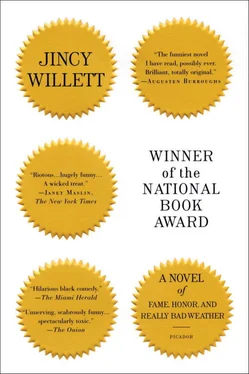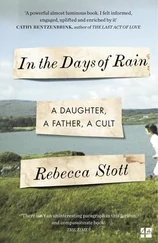All my life I had yearned for responsibility, for someone to need me, to require me to do some hard service, so that I could begin the business of my life. I yearned for duty the way Abigail yearned to show her ass. And here it was, my first assignment. Horribly, and for the last time, I burst into tears in the presence of one of my parents.
He covered my hand, the one gripping the chair, with one of his. “You surprise me, Dorcas,” he said. “I’ve never known you to be sentimental.” He squeezed my hand. “She was special, though, wasn’t she?” He was smiling sweetly at me, a father comforting his daughter, in control of the situation.
I blew my nose and took a few breaths. “Of course I’m not sentimental,” I said, “and I never knew you to be either, especially about movie stars. What’s happened here? What’s really wrong?”
“Nothing’s ‘really wrong.’” Father laughed, in a maddeningly fond way. “You don’t have to be ashamed, honey. Lots of people loved Marilyn Monroe.”
“Well, not me! You’re the one who’s making a big deal out of it!” As the tension drained away, humiliation rushed in to take its place.
“You know,” he said, “that there are only three women in the world I care about, and they’re all right here. I was just upset on your mother’s account. It seemed to hit her pretty hard, and Abigail, too.”
I couldn’t imagine why. Mother was a reader, not a fan. “Did she know her in high school or something?” Mother had gone to high school with Red Skelton.
“Mattie looks just like her,” Father said. “I’ve always thought so.”
“She does not,” I said. Although I knew what he meant. Mother had the baby-blond hair and a real sweetness, an innocence that made us all want to protect her. But she had a long, horsy face and an angular body. She gave the impression of softness because of her personality. Actually, she looked like a cross between Marilyn Monroe and, well, Arthur Miller. I said so, and it gave me no small satisfaction to see Father wince at my infliction of this sharp little truth.
“She’s Marilyn Monroe to me,” he said. “Prettier.”
“Excuse me,” I said, without looking at him, and went into the house. Mother was changing her bed and humming. “Mother,” I said, “are you all right?”
She nodded brightly, unable to more than grunt, with one corner of a pillow in her mouth as she coaxed it into its case.
“About Marilyn Monroe?” I said.
“Isn’t that sad,” she said. “Poor thing.”
“Does it especially bother you?”
“No.” Mother sighed. “But your sister is taking it very hard.”
Abigail was feeding baby Anna in the sunroom. She held the bottle carelessly, tilted slightly up, so that the baby had to work hard for her meal, and Abigail’s face was pale, her eyes red-rimmed. I took Anna and the bottle away from her and sat down to do the job properly.
“I know it’s crazy,” Abigail said, with her lower lip quivering, her big myopic blue eyes swimming in fresh, easy tears. “She died with a telephone in her hand. She was trying to call someone.” She sobbed freely, like a baby on its back. “Don’t you say it, Dorcas. I know I’m being dumb. But she was so…”
“…much prettier than you,” I said, “and now she’s gone.”
Abigail blew her nose. “Bitch,” she said. “She had a special quality, which I don’t expect you to appreciate.”
“And what quality is that?”
“Oh, you know.” She gestured impatiently toward Anna. Even in youth Abigail was profoundly lazy. She loved to make me finish her sentences for her.
“Infantilism? Baldness?”
“Innocence, you boob. But it wasn’t just that. She was…a pure tramp.”
“Takes one to know one.”
“Come on, you know what I mean. She was pure and a tramp. She had this way of making the whole world…I don’t know…what?”
“Salivate. Ogle her breasts. I give up.”
“Gosh, you’re hateful today.” Abigail threatened to cloud up again. “You wouldn’t appreciate this, but she had this special ability to make the whole world feel responsible for her. That’s it. She wasn’t supposed to watch out for herself. Everybody else was supposed to do it for her.”
I just let her run on. The bare idea of my sister feeling responsible for anything or anybody, including Marilyn Monroe, was beyond comment. She was quiet, finally, for a long time, and then she looked up at me and asked, shrewdly, without artifice, “Do you think I look like her at all? Do I remind you of her in any way?”
This was the sister I knew best, and loved, over my severest disapproval. Hard as nails, absolutely shameless. She had never hesitated to expose her worst self to me, or pretended to feel guilt, or even the justification for guilt, about anything.
She was, on this very day, the day of the dreadful news about Marilyn Monroe, a two-week widow, her shotgun husband, Everett Esser, having died of a heat stroke during basic training at Fort Gordon.
I had been with her when she got the news. She put down the telephone and told me, briefly, what had happened. She sat still for a while, without expression, absently hugging her fatherless baby. She sucked me in for a few minutes. I averted my eyes from the spectacle of my sister thinking, for perhaps the first time ever, about something besides herself. It was, for me, a holy moment. She cleared her throat. “Dorcas? Do you think we could hold off the funeral until Monday? Is there some law that says you have to do it right away?”
I was a little slow, but I got it. Country club dance on Saturday night. She had bought a dress for it, a Monroeish scarlet taffeta thing cut low to just about her nipples, stretched tight across her high waist, her appalling rump and thighs, flaring out with brilliant irony at the knees, allowing free movement now that none was possible. A 1962 version of the dress Amber St. Clair wore to the King’s Ball. The dress my sister had dreamed of wearing since she was twelve.
I told her she could wear it to the funeral, which, of course, would have to be held on Saturday, and that in any event if Everett’s parents caught wind of her cavorting at the Agawam Hunt Club dance they would cut her and the baby off without a cent.
“Shit,” she said. “You’re right.” And grieved, visibly, for her missed opportunity.
Abigail showed me everything. Only me. She cried at the funeral, and got her money, but she never pretended to me.
The only grief she has ever felt was for our parents, whose deaths were a year off, and for Conrad Lowe, whom she murdered and, in her own horrid way, loved. She cried with pleasure at the death of Marilyn Monroe.
“You are like her,” I said, “in that you are an amoral exhibitionist.”
“If I killed myself,” she asked dreamily, “would people feel responsible?”
“If you killed yourself, pigs would fly.”
Abigail laughed. “I’d be missed, though.”
“Sure. Every flag at Quonset Point Naval Air Station would be lowered to half staff.”
She smiled still, and closed her eyes, and slept like a cat, leaving me with the baby and the bottle. You are like her, I had refused to tell her, though she already knew it well, in that you make a man out of everybody.
Chapter Six
Diminished Responsibility

Chapter 6
After the Game
Nineteen fifty-three, just after Abigail turned fourteen, was the year Frome High won the state football championship. On the night of January 10, at 9:00 P.M., the winning touchdown scored, setting in motion a number of traditional rites. The ritual tearing down of the goal-posts. The ritual beer bacchanal in the woods behind the stadium, beside the frozen Assonocket Reservoir. The ritual human sacrifice.
Читать дальше













